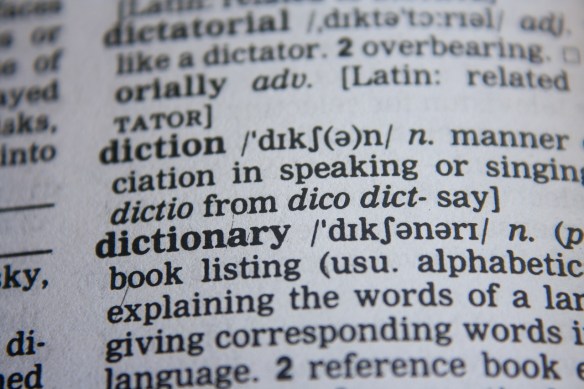By David Joel Miller, MS, Licensed Therapist & Licensed Counselor.
Please don’t say look it up in the dictionary.
A lot of people think the way to find the one “true, correct” meaning of a word is to look it up in the dictionary. It is just not that simple. The problem with agreeing on the meaning of the word psychology is a good example.
Depending on your age, the historical period you attended school, and the education system you attended, you probably used a very different dictionary. For my grandmother’s generation, the preferred dictionary was probably the Century Dictionary and Cyclopedia. For my generation, it was most likely Webster’s dictionary. Today the most likely choice is likely to be one of the online dictionaries. The more dictionaries you use, the more definitions you get.
The written and spoken words existed before the dictionaries.
The way the early dictionaries were created was to collect examples of how the words were used and then based on that context describe the meaning the writer had in mind. Older dictionaries might include a larger number of meanings or a particular word. Examples they listed would be heavy with quotations from Chaucer, Shakespeare, and Dickens, but probably also included many examples from other lesser-known authors. The writing came first, and that determined the meaning, not the other way around.
New words keep getting added to the dictionary as they are created. Existing words may have additional meaning added to their description as people using an existing word in a new way.
Professions have highly specialized dictionaries.
In interpreting legal documents and court orders, lawyers don’t refer to the same dictionary you might be using. They commonly look words up in “Black’s Law Dictionary.” People who work in the mental health field may use the DSM-5 or the ICD. Other professionals have their own specialized dictionaries.
Professional vocabularies are supposed to be used in very precise ways. In diagnosing bipolar disorder, there are specific criteria for a manic episode, a hypomanic episode, and a major depressive episode. The specific variety of bipolar disorder is diagnosed using these episodes.
When people today describe someone as bipolar, but they’re often describing is someone who is moody, irritable, or grouchy. Other times the term is applied to someone who’s moods change quickly. All these ways the word bipolar is being used may have little to do with the technical definition of bipolar disorder.
The term narcissism in psychology describes the trait of feeling good about yourself roughly the equivalent of self-esteem. In mental health, narcissism refers to Narcissistic Personality Disorder a serious mental illness.
Researchers may create “operational” definitions.
For research, psychologists might define a characteristic based on the score on a verbal screening instrument. People scoring above a certain number on the depression scale are considered depressed.
On an IQ scale, those with a score of 84 or below could be described as having intellectual challenges or disabilities, scoring 85 or above would be considered normal. Other than on that one test that one day, these two people might be impossible to tell apart.
There is a difference between denotative and connotative meanings.
Denotative meanings, those are the meanings that form the bulk of the contents of dictionaries. Hot, cool, and cold, these words all describe temperature. Scientists might define this in terms of the energy state of molecules. But in popular culture, those words, hot or cool might describe the newest, in, popular, music or personality, or fashion style.
Can you see how looking it up in the dictionary doesn’t always solve communication problems?
Staying connected with David Joel Miller
Seven David Joel Miller Books are available now!
My newest book is now available. It was my opportunity to try on a new genre. I’ve been working on this book for several years, but now seem like the right time to publish it.
Story Bureau is a thrilling Dystopian Post-Apocalyptic adventure in the Surviving the Apocalypse series.
Baldwin struggles to survive life in a post-apocalyptic world where the government controls everything.
As society collapses and his family gets plunged into poverty, Baldwin takes a job in the capital city, working for a government agency called the Story Bureau. He discovers the Story Bureau is not a benign news outlet but a sinister government plot to manipulate society.
Bumps on the Road of Life. Whether you struggle with anxiety, depression, low motivation, or addiction, you can recover. Bumps on the Road of Life is the story of how people get off track and how to get your life out of the ditch.
Dark Family Secrets: Doris wants to get her life back, but small-town prejudice could shatter her dreams.
Casino Robbery Arthur Mitchell escapes the trauma of watching his girlfriend die. But the killers know he’s a witness and want him dead.
Planned Accidents The second Arthur Mitchell and Plutus mystery.
Letters from the Dead: The third in the Arthur Mitchell mystery series.
What would you do if you found a letter to a detective describing a crime and you knew the writer and detective were dead, and you could be next?
Sasquatch. Three things about us, you should know. One, we have seen the past. Two, we’re trapped there. Three, I don’t know if we’ll ever get back to our own time.
For these and my upcoming books; please visit my Author Page – David Joel Miller
Want the latest blog posts as they publish? Subscribe to this blog.
For videos, see: Counselorssoapbox YouTube Video Channel

